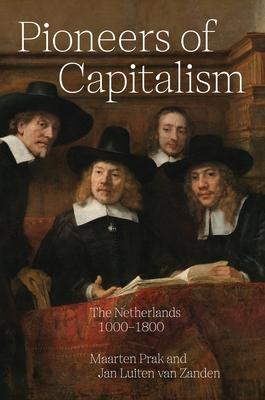How medieval Dutch society laid the foundations for modern capitalism
The Netherlands was one of the pioneers of capitalism in the Middle Ages, giving rise to the spectacular Dutch Golden Age while ushering in an era of unprecedented, long-term economic growth. Pioneers of Capitalism examines the formal and informal institutions in the Netherlands that made this economic miracle possible, providing a groundbreaking new history of the emergence and early development of capitalism. Drawing on the latest quantitative theories in economic research, Maarten Prak and Jan Luiten van Zanden show how Dutch cities, corporations, guilds, commons, and other private and semipublic organizations provided safeguards for market transactions in the state's absence. Informal institutions developed in the Netherlands long before the state created public safeguards for economic activity. Prak and van Zanden argue that, in the Netherlands itself, capitalism emerged within a robust civil society that constrained and counterbalanced its centrifugal forces, but that an unrestrained capitalism ruled in the overseas territories. Rather than collapsing under unrestricted greed, the Dutch economy flourished, but prosperity at home came at the price of slavery and other dire consequences for people outside Europe. Pioneers of Capitalism offers a panoramic account of the early history of capitalism, revealing how a small region of medieval Europe transformed itself into a powerhouse of sustained economic growth, and changed the world in the process.
Book
Pioneers of Capitalism: The Netherlands 1000-1800
(Write a Review)
$26.95
How medieval Dutch society laid the foundations for modern capitalism
The Netherlands was one of the pioneers of capitalism in the Middle Ages, giving rise to the spectacular Dutch Golden Age while ushering in an era of unprecedented, long-term economic growth. Pioneers of Capitalism examines the formal and informal institutions in the Netherlands that made this economic miracle possible, providing a groundbreaking new history of the emergence and early development of capitalism. Drawing on the latest quantitative theories in economic research, Maarten Prak and Jan Luiten van Zanden show how Dutch cities, corporations, guilds, commons, and other private and semipublic organizations provided safeguards for market transactions in the state's absence. Informal institutions developed in the Netherlands long before the state created public safeguards for economic activity. Prak and van Zanden argue that, in the Netherlands itself, capitalism emerged within a robust civil society that constrained and counterbalanced its centrifugal forces, but that an unrestrained capitalism ruled in the overseas territories. Rather than collapsing under unrestricted greed, the Dutch economy flourished, but prosperity at home came at the price of slavery and other dire consequences for people outside Europe. Pioneers of Capitalism offers a panoramic account of the early history of capitalism, revealing how a small region of medieval Europe transformed itself into a powerhouse of sustained economic growth, and changed the world in the process.Paperback
$26.95